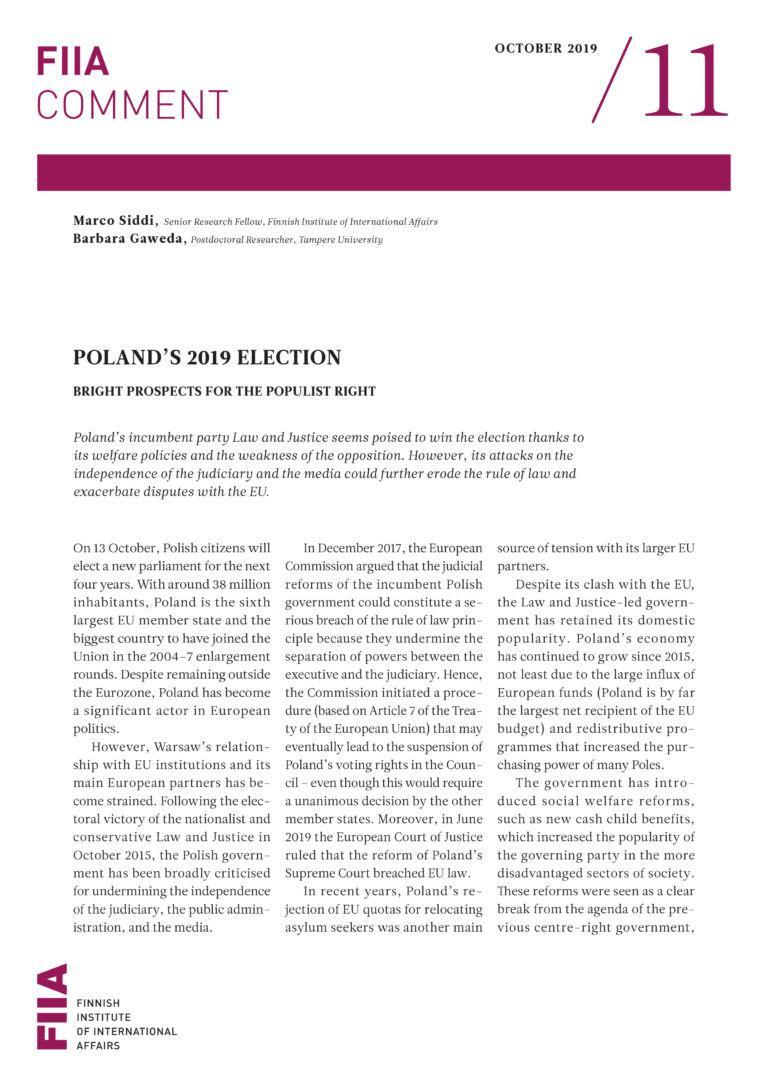Poland’s incumbent party Law and Justice seems poised to win the election thanks to its welfare policies and the weakness of the opposition. However, its attacks on the independence of the judiciary and the media could further erode the rule of law and exacerbate disputes with the EU.
On 13 October, Polish citizens will elect a new parliament for the next four years. With around 38 million inhabitants, Poland is the sixth largest EU member state and the biggest country to have joined the Union in the 2004–7 enlargement rounds. Despite remaining outside the Eurozone, Poland has become a significant actor in European politics.
However, Warsaw’s relationship with EU institutions and its main European partners has become strained. Following the electoral victory of the nationalist and conservative Law and Justice in October 2015, the Polish government has been broadly criticised for undermining the independence of the judiciary, the public administration, and the media.
In December 2017, the European Commission argued that the judicial reforms of the incumbent Polish government could constitute a serious breach of the rule of law principle because they undermine the separation of powers between the executive and the judiciary. Hence, the Commission initiated a procedure (based on Article 7 of the Treaty of the European Union) that may eventually lead to the suspension of Poland’s voting rights in the Council – even though this would require a unanimous decision by the other member states. Moreover, in June 2019 the European Court of Justice ruled that the reform of Poland’s Supreme Court breached EU law.
In recent years, Poland’s rejection of EU quotas for relocating asylum seekers was another main source of tension with its larger EU partners.
Despite its clash with the EU, the Law and Justice-led government has retained its domestic popularity. Poland’s economy has continued to grow since 2015, not least due to the large influx of European funds (Poland is by far the largest net recipient of the EU budget) and redistributive programmes that increased the purchasing power of many Poles.
The government has introduced social welfare reforms, such as new cash child benefits, which increased the popularity of the governing party in the more disadvantaged sectors of society. These reforms were seen as a clear break from the agenda of the previous centre-right government, which neglected welfare policies and rising inequality. The Law and Justice-led government also capitalised on the fact that the centre-right opposition was partly discredited by its involvement in political and financial scandals.
The results of the May 2019 European elections confirmed the popularity of Law and Justice, which obtained over 45% of the votes. The party performed well in small towns, rural constituencies, among voters with basic or technical education, pensioners, and the unemployed; it received less support in the largest cities.
Despite having joined forces in the ‘European Coalition’, the main opposition parties received 38% of the votes and were defeated. The coalition included the centre-right Civic Platform, the neoliberal party ‘Modern’, the Democratic Left Alliance, the Polish People’s Party, and the Greens. This eclectic electoral alliance, uniting conservative agrarians and urban liberals, could not develop a clear and coherent message.
As a result, the opposition has partly reorganised itself in view of the upcoming national elections. The Democratic Left Alliance has left the European Coalition and will run on a common platform (called ‘The Left’) with the new liberal party ‘Spring’ and the leftist ‘Together’. The Polish People’s Party has formed a new coalition with smaller parties, with the main goal of recovering its traditional rural constituencies from Law and Justice.
Even so, Law and Justice is clearly leading in opinion polls. In the run-up to the elections, the party appears to be pursuing a double strategy. At the EU level, it has taken a seemingly more conciliatory stance – for instance by voting in favour of Ursula von der Leyen as the new Commission President and by not protesting against the exclusion of its candidates from committee chair appointments in the European Parliament. This could also be linked to the ongoing negotiations over the next long-term EU budget, and Warsaw’s fear that funds may be tied to respect of the rule of law.
Domestically, however, Law and Justice continues to consolidate its grip on the country’s governance institutions. The government has recently orchestrated a smear campaign against judges opposed to its judicial reforms. It is now planning a reshuffle of the judiciary that would consolidate the party’s control of the system.
According to the World Press Freedom report for 2019, Polish public media have been ‘renamed “national media” and transformed into government propaganda mouthpieces’. In 2017, Freedom House downgraded Poland from ‘free’ to ‘partly free’ due to government intolerance of critical reporting. Law and Justice is now discussing the idea of limiting foreign investment in private media and replacing it with state funds, thereby strengthening governmental control in this sector as well.
The government’s illiberal policies were accompanied by ultraconservative and nationalist rhetoric, targeting sexual minorities in particular. While in 2015 Law and Justice ran its electoral campaign targeting migrants and refugees, it is now rallying conservative voters against ‘LGBT ideology’. Under the guise of patriotism, it has also promoted a nationalist politics of history, which led to controversies with Israel, Ukraine, and Russia, and the condemnation of numerous professional historians.
If Law and Justice wins the upcoming election, its policies and rhetoric are unlikely to change substantially. In all probability, Poland’s domestic developments will continue to pose a serious challenge within the European Union.





